
Angliyskiy_1_chast_uchebnik
.pdfIII. Заполните пропуски притяжательными местоимениями.
1. We're students. This is … classroom. The door in … classroom is white. 2. I’m at home now. … room is small, but it’s light and clean. These are … sisters. … names are Mary and Ann. 3. Open … books, please. 4. Sit down, Peter. … mark is “good”. 5 Is she a teacher. Are these boys and girls … pupils? 6. This man is an engineer. … name’s Petrov.
IV. Заполните пропуски артиклями, где это необходимо.
1. What colour is … floor in your room? 2. Write … question on … blackboard, please. 3. Please open … window. 4. Please close … door. 5. Give him … piece of
…chalk? 7. Where’s … chalk? 8. Where’s … Room Six? 9. … exercise-book is on
…table.
V. Поставьте вопросы к выделенным словам.
1. It is our classroom. (2) 2. It is a light room. (1) 3. The walls in my room are yellow. (3) 4. This cup is white. (1) 5. They are new ties. (1) 6. The table is at the window. (1) 7. The chairs are at the table. (1) 8. Klimov is our teacher. (3) 9. Peter is sitting at the window. (3) 10. It is an English newspaper. (2)
VI. Заполните пропуски предлогами, где это необходимо.
1. The walls … the rooms … my flat are yellow and blue. 2. Please go … the blackboard, Peter. He is … the blackboard now. 3. Take a piece … chalk … the table and write these words, please. Who’s writing the new words … the blackboard? 4. Please come … the room. 5. We are going … the classroom. Please go … the classroom. 6. The blackboard is … the wall … our classroom. 7. Please put these matches … your bag. 8. Please open that book … page eight. 9. They are looking … the boys.
VII. Ответьте на вопросы:
1.Is this a classroom?
2.What kind of classroom is this?
3.Is it large or small?
4.What colour are the walls in this classroom?
5.What colour is the floor (ceiling, door)?
6.Where’s the blackboard?
7.What colour is it?
8.Where’s the piece of chalk?
9.Where are you?
10.Are you at a lesson or at home?
11.Is Ann at the blackboard or at her table?
12.What’s she doing there?
13.Is your bag new?
14.Is this a table or a chair?
15.Where’s your friend sitting?
VIII. Раскройте скобки, употребляя глаголы в Present Continuous и переведите предложения.
1. My sister (to sleep) now. 2. My sister (to sleep) now? 3. My sister (not to sleep)
90
now. 4. My friends (not to do) their homework now. They (to play) volleyball. 5. My friends (to play) volleyball now? 6. They (not to play) volleyball. 7. What game they (to play)? 8. Look! My cat (to play) with a ball. 9. What my cat (to play) with? 10. What you (to drink)? – I (to drink) coffee. 11. You (to drink) Coke? – No, I (to drink) tea. 12. Who (to make) dinner for you right now? – My mother... . 13. What he (to do)? – He (to listen) to the radio. 14. She (to go) to Scotland on Friday. 15. She (to go) to Scotland on Monday? – No, she … . – When she (to go) there? 16. Where she (to stay) in Scotland? – She (to stay) in a hotel. 17. What your friend (to do) tonight?
– He (to meet) Jane at the station at 7 o’clock. 18. Mike (to go) to the station. He (to meet) his mother. 19. Where Mike (to go)? 20. Why he (to go) to the station? 21. Look! The baby (to sleep). 22. When they (to come) from England? – They (to come) on Sunday. 23. When you (to have dinner) with your sister? – I (to have dinner) with her on Friday. 24. Where you (to have dinner) with her? 25. You always (to sleep) at the lessons! 26. Your cat always (to sleep) on my bed! 27. That cook constantly (to make) terrible soups! 28. He constantly (to talk) to his friend at my lessons! 29. Their French (to get) better. 30. I (to read) an interesting story these days. 31. What it (to be) about? – It (to be) about robots.
IX. Заполните пропуски глаголами в нужной форме и при необходимости измените порядок слов.
come look |
make |
try |
work |
go |
have a good time |
read (2) |
do |
(2) |
meet |
take |
copy out |
1.You … a lot of noise. Be quiet! I … to concentrate.
2.What all these students … here? – They … their final exam.
3.What book you … ? – I … a textbook.
4.Where are you? – We are in the restaurant. We … . Join us! (Присоединяйся к нам!)
5.Where he … ? – To the clinic.
6.The students are at the lesson. They … at the blackboard and … new words.
7.They … tonight. We … them at the station at 6 o’clock.
8.What you … on Friday evening? – I am busy. I … .
X. Переведите нa английский язык.
а) обращая внимание на употребление предлогов:
слова четвертого урока, страницы той книги, новые слова тех уроков, три куска мела, цвет этой сумки, стены нашей аудитории, рабочие Киева, ученики этой школы, потолок той комнаты, дверь их аудитории, инженеры этого завода, официантки того ресторана, повар нашего ресторана.
б) обращая внимание на употребление форм повелительного наклонения:
1. Не посылайте Кате те книги. Пошлите Кате эти новые книги, пожалуйста. 2.
91
Встречайте этих инженеров здесь, пожалуйста. 3. Не давайте мне черный карандаш, дайте мне, пожалуйста, красный карандаш. 4. Не читайте этот текст на уроке, прочитайте его дома, пожалуйста. 5. Не берите мою тетрадь, возьмите ту чистую тетрадь, пожалуйста. 6. Пишите слова и вопросы в своих тетрадях и не смотрите на доску, пожалуйста. 7. Закройте свои книги и откройте тетради, пожалуйста. 8. Не закрывайте свои книги. Читайте восьмой текст, пожалуйста. 9. Не кладите свою сумку на стол, пожалуйста, положите ее на этот стул. 10. Не списывайте третий текст, спишите четвертый текст, пожалуйста. 11. Доброе утро! Садитесь, пожалуйста. 12. Не ходите туда, пожалуйста. 13. Не делайте этого, пожалуйста. 14. Не пишите этих слов сейчас, пожалуйста, сделайте это дома. 15. Идите сюда, пожалуйста. 16. Не уезжайте сейчас, пожалуйста. 17. Посмотри! Мой друг сидит вон там. 18. Как у тебя дела? – Спасибо, хорошо. А у тебя? 19. Увидимся сегодня вечером.
в) употребляя активную лексику урока:
1. Это наша классная комната. Какого цвета стены в вашей классной комнате? – Они желтые. – Ваша классная комната маленькая или большая? – Она небольшая, но светлая. 2. Какого цвета потолок? – Он белый. – Какого цвета пол? – Он коричневый. 3. Где ваш стол? – Он у окна. 4. Она читает вопросы. 5. Возьмите мел, пожалуйста, и напишите свой вопрос на доске. 6. Какого цвета ее тетрадь? – Она голубая. 7. Вы читаете новую книгу? 8. Я даю вам восемь новых карандашей. 9. Что делают сейчас эти студенты? – Они пишут новые слова. 10. Он уезжает в Шотландию сегодня вечером. 11. Когда он уезжает в Шотландию? 12. Он едет в Шотландию один? – Нет, с друзьями. 13. Они встречают Джейн на вокзале в 7 вечера. 14. В котором часу вы идете на вокзал? – В 8 утра. 15. Ты постоянно разговариваешь со своим другом на уроках! 16. Он работает сегодня?
– Нет. 17. Куда идут те люди? – Они идут в музей. 18. Куда идут дети? – Они идут в супермаркет. 19. Где остановились твои друзья? – Они остановились в гостинице. 20. Алиса идет к зубному врачу в пятницу. 21. Что ты делаешь в воскресенье? – Я иду в ресторан.
92
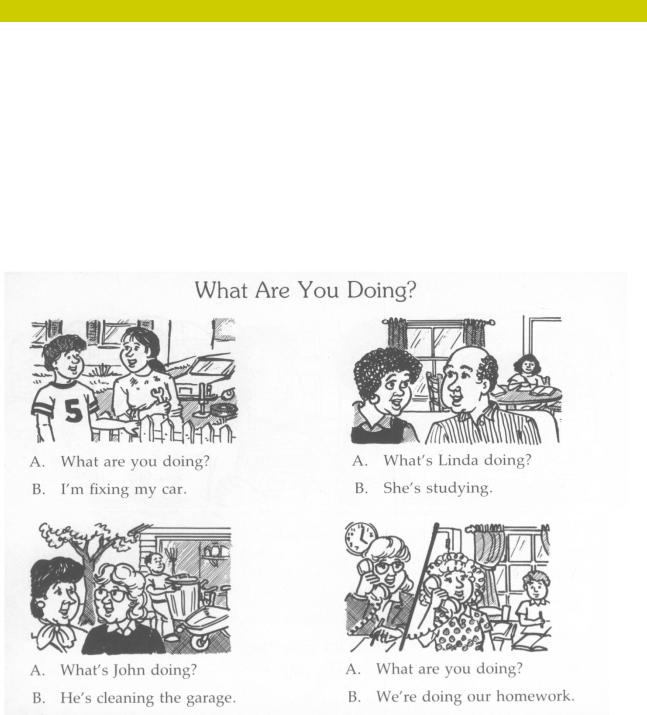
УПРАЖНЕНИЯ НА РАЗВИТИЕ НАВЫКОВ УСТНОЙ РЕЧИ
I. Ваш друг планирует поехать на отдых. Поинтересуйтесь его планами,
употребляя Present Continuous.
1. |
(where / go?) |
Scotland. |
2. |
(when / go?) |
Tonight. |
3. |
(how long / stay?) |
Ten days. |
4. |
(go / alone?) |
No, with my friend. |
5. |
(go / by car?) |
No, by bus. |
6. |
(where / stay?) |
In a hotel. |
II. Прослушайте диалоги и повторите за диктором.
to fix [tə 'fiks] – ремонтировать
to clean [tə 'kli:n] – чистить, наводить порядок a garage [ə 'ɡæraːʒ] – гараж
93
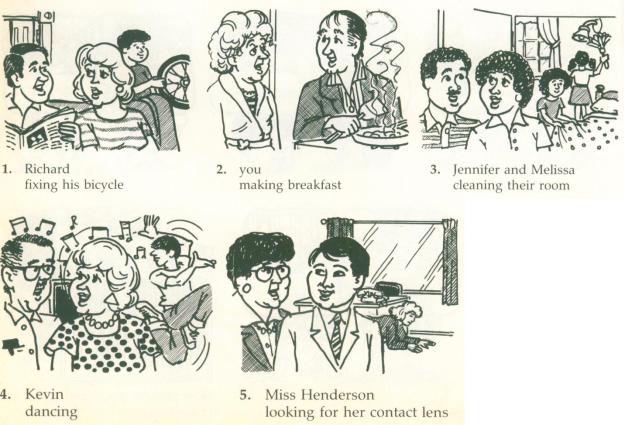
III. Составьте диалоги по образцу из упражнения № II.
a bicycle [ə ' baɪsɪkl] – велосипед breakfast ['brekfəst] – завтрак
to dance [tə 'da:ns] – танцевать to look for [tə 'luk] – искать
a contact lenz [ə 'kɔntækt 'lenz] – контактная линза (мн.ч. lenses)
94
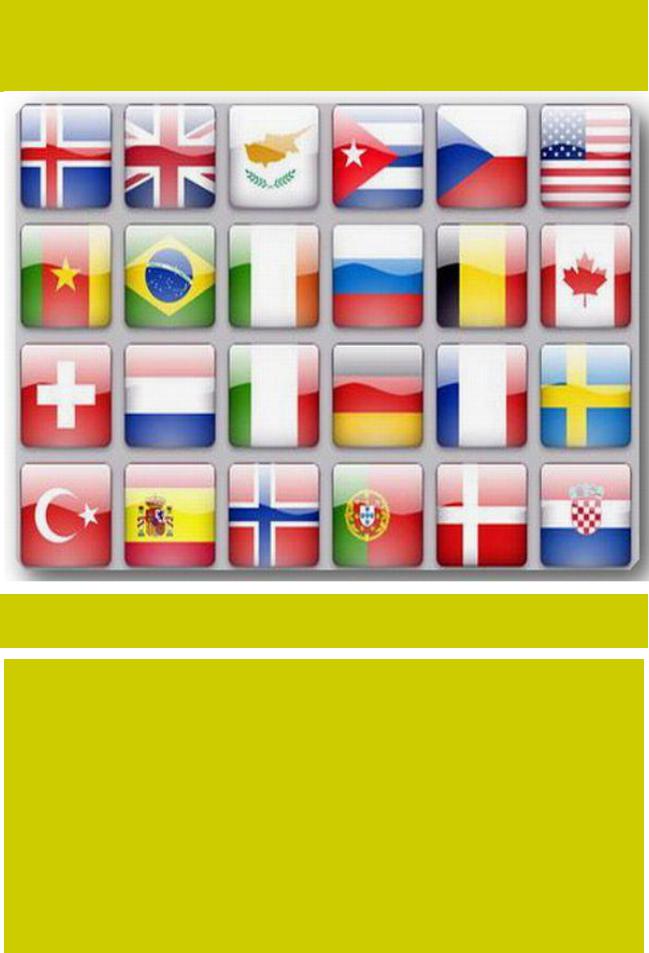
Урок 14
WHERE ARE YOU FROM?
Grammar review
1.Глагол to be.
2.Сказуемое. Типы сказуемых. Составное именное сказуемое.
95
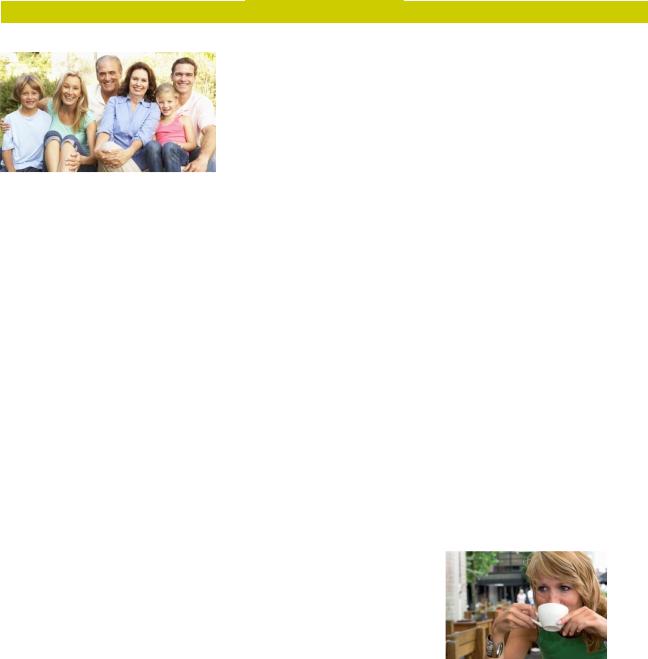
TEXT FOURTEEN
72 Newton Drive
London
3d October
Dear David,
How are you? I’m fine. I’m in London, at the International school of English. I’m in class three with eight other students. They are all from different countries – Spain, France, Japan, Argentina, Switzerland, and Thailand. Our teacher’s name is Peter Briscall. He’s very nice. He’s funny and he is a very good teacher.
My new address is at the top of the letter. I’m with an English family, the Browns.
Mr. and Mrs. Brown have three children. Thomas is fourteen, Catherine is twelve, and Andrew is seven. They are all very friendly, but it isn’t easy to understand them.
London is very big and very interesting. The weather is good – cold but sunny – and the parks are beautiful! Hyde Park, Green Park, and St James’ Park are all in the centre. It isn’t easy to use the Underground, but I understand it now. It’s very expensive!
English food is OK, but the coffee is horrible!
Write to me soon,
Love, Paola
P.S. Is my English OK?
I. Ответьте на вопросы по тексту:
1.Whom is this letter from?
2.Where is she?
3.Is Paola in class three or in class two?
4.Where are the students from?
5.What is their teacher’s name?
6.What kind of man is he?
7.What kind of teacher is he?
8.Is Paola at a hotel?
9.Is the family big?
10.How old is Thomas?
11.How old is Catherine?
12.How old is Andrew?
13.What kind of people are they?
96

14.Is it easy to understand them?
15.What kind of city is London?
16.Is the weather bad?
17.Are the parks terrible?
18.What parks are in the centre of London?
19.Is it easy to use the Underground?
20.Is it cheap?
21.Is English food horrible?
22.Is English coffee OK?
23.Is Paola’s English good?
II. Определите, являются ли следующие утверждения верными:
Paola is Italian. – Yes, she is. She is Italian.
She’s in Rome. – No, she isn’t. She’s in London.
a.Paola is on holiday.
b.Paola is a student of Russian.
c.She is happy in London.
d.It’s a very big class.
e.The students in her class are all from Europe.
f.Paola’s teacher is horrible.
g.The teacher’s name is David.
h.Paola is staying at a nice hotel.
i.Mr and Mrs Brown have two sons and a daughter.
j.The Browns are very friendly.
k.It is difficult to understand the Browns.
l.The weather is very warm.
m.The Underground is cheap.
n.The food in London is horrible.
ИМЕНА СОБСТВЕННЫЕ
|
|
David [ˈdeɪvɪd] |
|
Дэвид |
||
|
|
Thomas [ˈtɔməs] |
|
Томас |
||
|
|
Catherine [ˈkæθrɪn] |
|
Кэтрин |
||
|
|
Andrew [ˈændru:] |
|
Эндрю |
||
|
|
|
|
|
|
|
|
|
|
АКТИВНЫЙ СЛОВАРЬ |
|
||
|
|
|
|
|
||
|
1. |
dear [dɪə] |
|
дорогой |
||
|
2. |
international [ˌɪntəˈnæʃənəl] |
|
международный |
||
|
|
|
|
97 |
|
|
3. |
all [ɔːl] |
все |
4. |
different [ˈdɪfrənt] |
разный, различный |
5. |
country [ˈkʌntri] |
страна |
6. |
Spain [speɪn] |
Испания |
7. |
France [fra:ns] |
Франция |
8. |
Japan [dʒəˈpæn] |
Япония |
9. |
London [ˈlʌndən] |
Лондон |
10. Argentina [ˌa:dʒənˈtiːnə] |
Аргентина |
|
11. Switzerland [ˈswɪtsələnd] |
Швейцария |
|
12. Thailand [ˈtaɪˌlænd] |
Тайланд |
|
13. very [ˈveri] |
очень |
|
14. funny [ˈfʌni] |
веселый, смешной |
|
15. address [əˈdres] |
адрес |
|
16. at the top of [ət ðə ˈtɔp əv] |
вверху, в верхней части |
|
17. letter [ˈletə] |
письмо |
|
18. family [ˈfæməli] |
семья |
|
19. fourteen [ˌfɔːˈtiːn] |
четырнадцать |
|
20. twelve [twelv] |
двенадцать |
|
21. friendly [ˈfrendli] |
дружелюбный |
|
22. all [ɔːl] |
все |
|
23. easy [ˈiːzi] |
легкий |
|
24. understand [ˌʌndəˈstænd] |
понимать |
|
25. interesting [ˈɪntrəstɪŋ] |
интересный |
|
26. weather [ˈweðə] |
погода |
|
27. cold [kould] |
холодный |
|
28. sunny [ˈsʌni] |
солнечный |
|
29. beautiful [ˈbjuːtəfəl] |
красивый |
|
30. Hyde Park [ˈhaɪd ˈpa:k] |
Гайд парк |
|
31. St.James’ Park [snt ˈdʒeimz ˈpa:k] |
парк Святого Джеймса |
|
32. to use [tə ˈjuːz] |
использовать |
|
33. underground [ˌ ʌndəˈgraund] |
метро |
|
34. expensive [ɪkˈspensɪv] |
дорогой |
|
35. horrible [ˈhɔrəbəl] |
ужасный, отвратительный |
|
36. soon [ˈsuːn] |
скоро |
|
37. to love [tə ˈlʌv] |
любить |
|
38. with [wɪð] |
с |
|
39. them [ðem] |
им, их |
|
40. in the centre (of) [ˈsentə] |
в центре |
|
41. cheap [tʃiːp] |
дешевый |
|
98
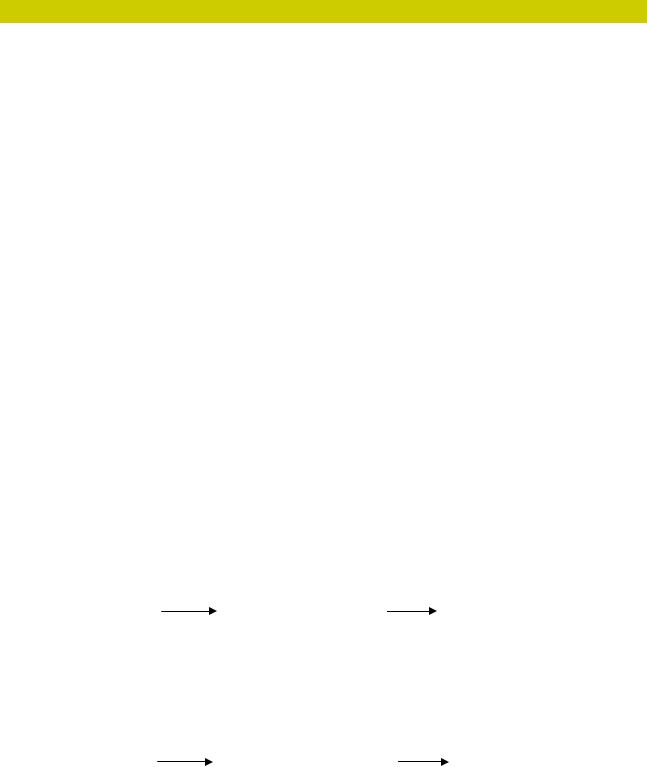
ГРАММАТИЧЕСКИЕ ПОЯСНЕНИЯ К ТЕКСТУ
§ 29. СКАЗУЕМОЕ. ТИПЫ СКАЗУЕМЫХ.
Сказуемое – главный член предложения, обозначающий признак (действие, состояние, свойство, качество) того предмета, который выражен подлежащим. Сказуемое отвечает на вопросы: Что делает лицо или предмет,
обозначенный подлежащим? Что делается с ним? Что собой представляет лицо или предмет, обозначенный подлежащим?
По своей структуре сказуемое может быть:
а) простым глагольным, обозначающим действие и выраженным глаголом в личной форме в любом времени, залоге и наклонении:
Please send me a pen. |
Пришлите мне ручку, |
|
пожалуйста. |
Please tell Ann my name. |
Скажите, пожалуйста, Анне |
|
мое имя. |
б) составным именным, |
обозначающим состояние, качество, |
принадлежность к классу предметов. Составное именное сказуемое состоит из двух частей: глагола-связки (например, глагола to be) в личной форме и именной части. В отличие от русского языка, глагол-связка в английском языке никогда не опускается.
Thomas is fourteen. Томасу четырнадцать лет.
§ 30. СОСТАВНОЕ ИМЕННОЕ СКАЗУЕМОЕ.
Именная часть составного именного сказуемого может быть выражена:
а) именем существительным
ПОДЛЕЖАЩЕЕ |
ГЛАГОЛ-СВЯЗКА |
ИМЕННАЯ ЧАСТЬ |
|
|
СКАЗУЕМОГО |
He |
is |
a student. |
Он |
|
студент. |
б) именем прилагательным |
|
|
ПОДЛЕЖАЩЕЕ |
ГЛАГОЛ-СВЯЗКА |
ИМЕННАЯ ЧАСТЬ |
|
|
СКАЗУЕМОГО |
My pen |
is |
bad. |
Моя ручка |
|
плохая. |
в) числительным
99
